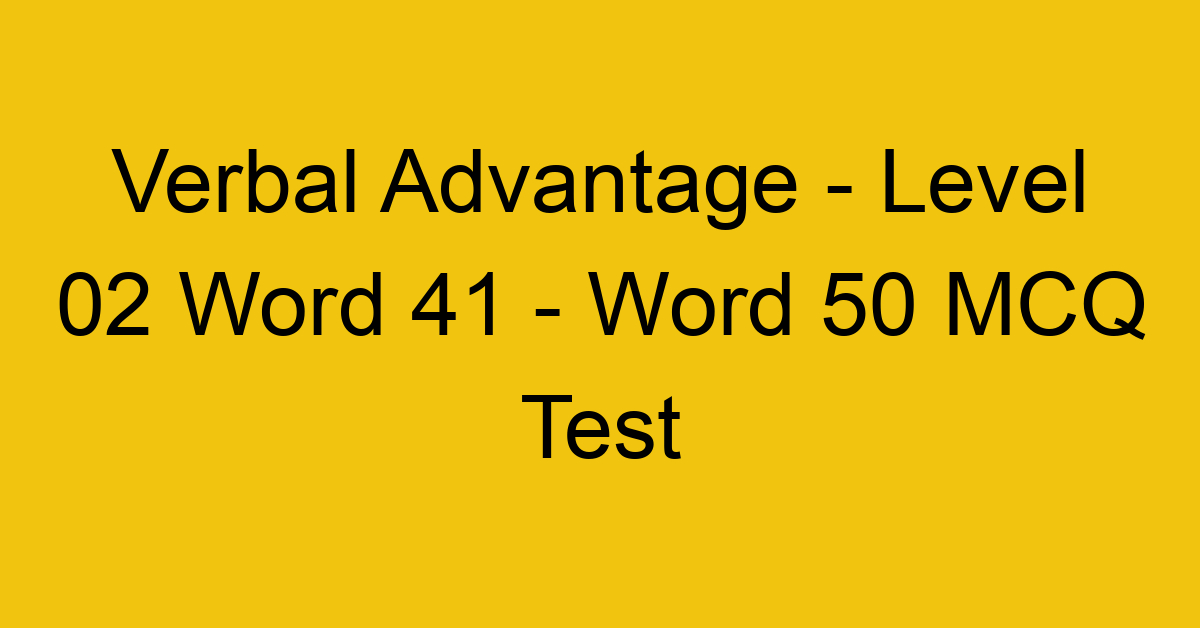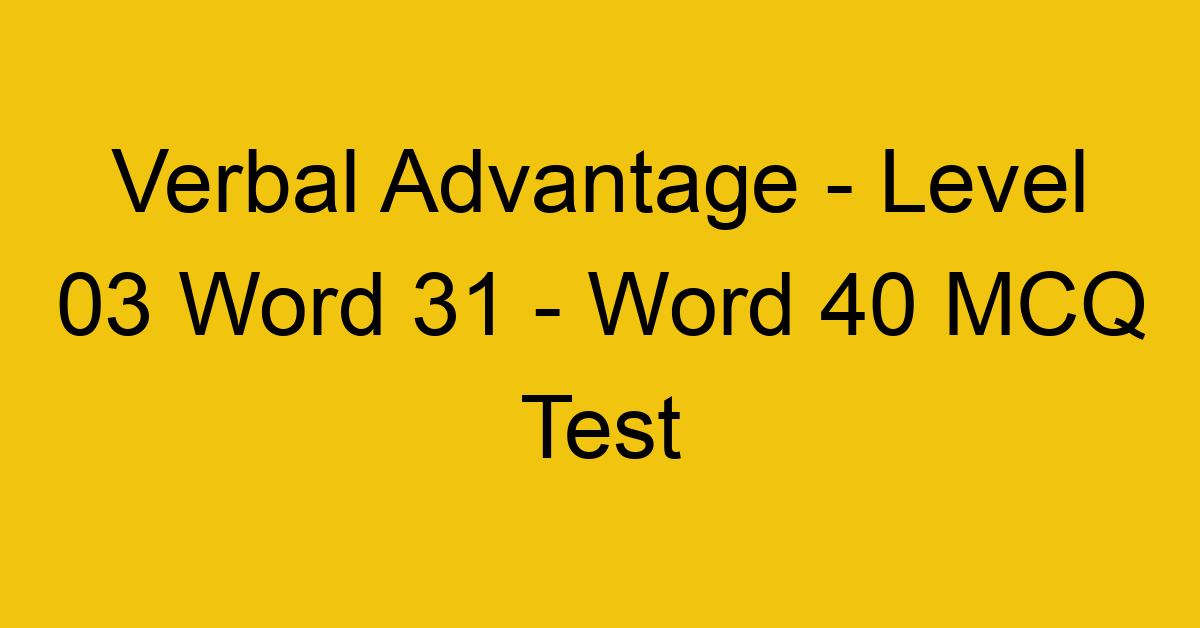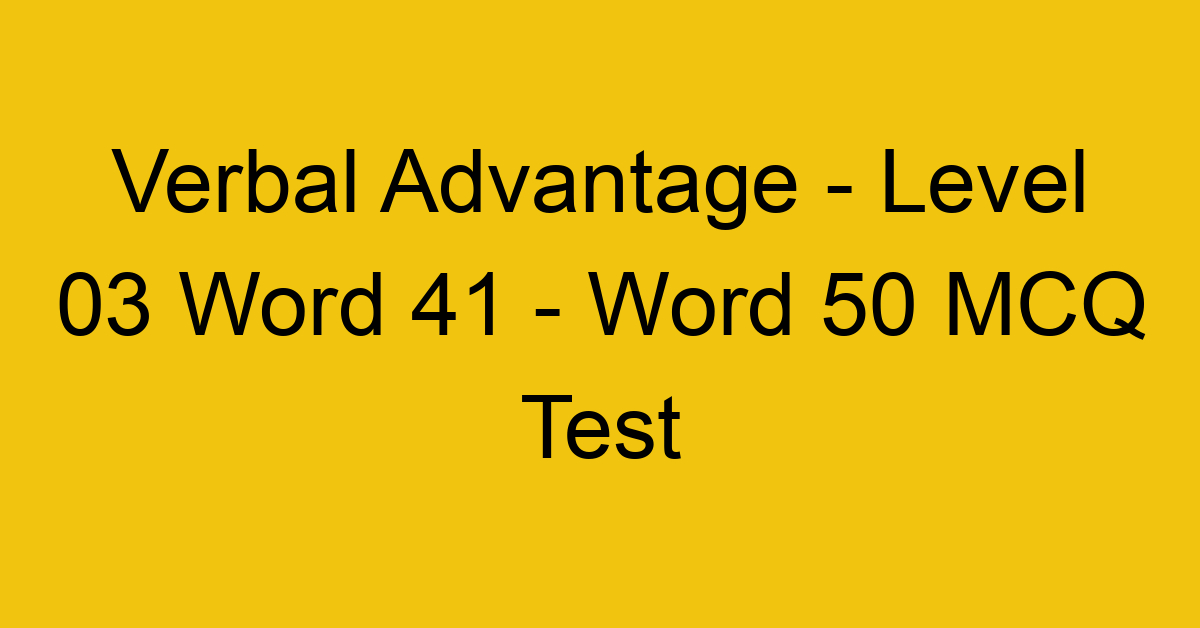Verbal Advantage - Level 03 Word 11 - Word 20 MCQ Test
Word List
- Word 11: Circumscribe [sur-kum-SKRYB or SURkum-skryb]
To limit, restrict, confine, hem in, fix the boundaries of.
→
The scribe in circumscribe means to write, draw, and circum- means around. Literally, circumscribe means to draw a line around, encircle; figuratively, it means to enclose within narrow limits, restrict, confine: the circumscribed routine of daily life; a law that circumscribes certain rights.
You can see the combining form circum- at work in many English words. Circumstance combines circum-, around, with the Latin stare, to stand, and means literally “that which stands around”; hence, a condition or factor influencing a situation or surrounding an event. Circumcision combines circum- with incision to mean literally “a cutting around.” Circumvent combines circum-, around, with the Latin venire, to go, and means to go around, bypass, especially in a clever or resourceful way: “She had to circumvent a lot of red tape to get the job done.” From this somewhat circumlocutory (SUR-kum-LAHK-yuh-tor-ee), or roundabout, discussion, can you guess the meaning of circumnavigate? That’s right: It means to navigate or sail around, as to circumnavigate the earth.
Our keyword, circumscribe, means literally to draw a line around; hence, to enclose within narrow limits, fix the boundaries of: “A limited vocabulary can circumscribe your career and undermine your chances for success.”
- Word 12: Dearth [rhymes with earth]
A lack, scarcity, insufficiency, inadequate supply of something needed.
→
A more difficult synonym of dearth is paucity (PAW-si-tee, word 2 of Level 10). Antonyms of dearth include abundance, surplus, excess, superfluity (SOO-pur-FLOO-i-tee), plethora (PLETH-uh-ruh, word 19 of Level 6), and surfeit (SUR-fit, word 49 of Level 8).
Dearth is a noun formed from the adjective dear. Something dear is precious, costly, highly valued. Literally, a dearth is a lack of something dear. Dearth is now used of any serious insufficiency or inadequate supply: a dearth of supplies; a dearth of hope; a dearth of opportunities in the job market.
- Word 13: Ingratiating [in-GRAY-shee-AY-ting]
Flattering, attempting to win approval or curry favor, trying to gain acceptance, done to charm or please another.
→
The word unctuous (UHNGK-choo-us), which was discussed under glib, keyword 8 in this level, is a close synonym of ingratiating.
Ingratiating comes from the Latin in, which means in or into, and gratia, grace. By derivation ingratiating means getting into the good graces of another.
Dictionaries and thesauruses often give charming, pleasing, and agreeable as synonyms of ingratiating, but today the word is rarely used in a positive sense. Invariably it has the negative suggestion of charming in an insincere way, pleasing in an attempt to win approval or curry favor, agreeable so as to get into the good graces of another: “Every time Don walked by the boss’s office or passed him in the hallway, he would flash a fake, ingratiating smile. That, and other unctuous gestures, soon made Don’s coworkers loathe him.”
- Word 14: Mercenary [MUR-suh-NER-ee]
Greedy, done for payment only, motivated by a selfish desire for money or other reward.
→
Synonyms include covetous and avaricious, which are discussed in word 40 of Level 2.
Mercenary is also close in meaning to the challenging word venal (VEE-nul). Venal means corruptible, capable of being bribed or bought off: a venal social climber; a venal politician.
The noun a mercenary denotes a hired soldier, one who fights not for a cause or for love of country but for money. The adjective mercenary means done for payment only, motivated by greed: “Harry’s interest in the deal was strictly mercenary.”
- Word 15: Extemporize [ek-STEM-puh-ryz]
To improvise, to speak or compose with little or no preparation or practice, perform something in an offhand or unpremeditated way: “She delivered her speech using notes, but during the question-and-answer session she extemporized.”
→
To improvise is the general word meaning to make up on the spur of the moment. You can improvise a speech, a tune on the piano, or a plan of action. Extemporize usually refers specifically to speaking in an offhand, spontaneous way. The corresponding adjective extemporaneous means spoken or composed with little or no preparation or practice. Extemporaneous remarks are impromptu, made up on the spur of the moment.
- Word 16: Erudite [traditionally, ER-uh-DYT; now usually ER-yuh-DYT]
Learned, scholarly, possessing extensive knowledge acquired chiefly from books.
→
Erudite comes from the Latin erudire, to instruct, educate, polish, free from roughness or rudeness. The corresponding noun is erudition, extensive knowledge acquired from reading books: “He displayed his erudition with wit and grace.”
People and things can both be erudite. For example, erudite professors often write erudite studies of obscure subjects. Reading Verbal Advantage will help you build an erudite vocabulary, which in turn will help you become a more erudite person, someone who possesses a wide store of knowledge.
I should point out that my pronunciation of erudite and erudition is slightly different from most educated speakers. Today most people pronounce these words with a long u: AIR-yoo-DYT (or AIR-yuh-) and AIR-yoo-DISH-un (or AIR-yuh-). The interesting thing is that the speakers who prefer these long-u pronunciations rarely take pains to preserve the traditional long-u sound in duty, assume, student, opportunity, or prelude (properly PREL-yood, not PRAY-lood). Yet they have trained themselves to say AIR-yoo-DYT and AIR-yoo-DISH-un presumably because the cultivated sound of the long u complements the meaning of these words.
The long-u pronunciations of erudite and erudition are not incorrect. In fact, they have been acceptable for several decades and all current dictionaries list them. However, to my hypercritical ear they smack of pseudosophistication, or sham erudition, because they ignore the etymologically significant rude dwelling within these words and illogically transform a short Latin u into a long English u. And so I remain faithful to the older, though now less popular, pronunciations ER-uh-DYT and ER-uh-DISH-un. (For more on the pronunciation of erudite, see my Big Book of Beastly Mispronunciations.)
- Word 17: Austere [aw-STEER]
Severe, somber, stern, serious, grim, grave, dour (properly rhymes with poor, not sour).
→
Austere may mean severe or stern in appearance, manner, or practice. An austere person is forbidding, somber, grave. An austere lifestyle is characterized by strict self-discipline or severe self-denial. Austere surroundings have a dearth of creature comforts or decoration; they are grim and barren.
- Word 18: Laconic [luh-KAHN-ik]
Using few words, briefly and often bluntly expressed.
→
Laconic comes from the Greek lakonikos, a Spartan, a resident of the ancient city state of Sparta, which was renowned for its austere and warlike people. By derivation laconic refers to the Spartans’ reputation for rigorous self-discipline and reticence.
Synonyms of laconic include succinct, concise, terse, and pithy. We discussed some of these words earlier in this level, under terse (word 3), but it’s worth going over them again so you can clearly distinguish their meanings.
Succinct means expressed in the briefest, most compressed way possible: a succinct update on the issue. Concise implies expression that is free from all superfluous words: a concise letter of resignation. Terse adds to concise the suggestion of pointedness and polish: a terse presentation. Pithy refers to concise expression that is full of meaning and substance, that is both brief and profound: pithy advice.
Laconic expression may be either terse or pithy, but it also implies an abruptness that can seem brusque or indifferent. Julius Caesar’s three-word pronouncement, “Veni, vidi, vici” (I came, I saw, I conquered), is one of the most famous laconic statements of all time. There is also the anecdote about Calvin Coolidge, the thirtieth president of the United States, who was legendary for his taciturnity, extreme reluctance to speak. As the story goes, someone once approached Coolidge and said, “Mr. President, I bet I can make you say more than three words.” Without hesitating or even cracking a smile, Coolidge shot back, “You lose.” Now that’s laconic wit.
Like the ancient Spartans, the laconic speakers and writers of today are determined to use no more words than are necessary to get the point across, even at the risk of giving offense.
- Word 19: Ameliorate [uh-MEEL-yuh-rayt]
To make or become better or more tolerable, improve, amend, correct, reform, rectify, raise the condition or state of.
→
Ameliorate is used chiefly of improving something that needs help because it is inferior, oppressive, or intolerable. City officials may decide to ameliorate a run-down neighborhood. A charitable organization may work to ameliorate the hapless condition of the homeless or the poor.
- Word 20: Expunge [ek-SPUHNJ]
To erase, delete, cancel; punch, strike, or wipe out; eradicate, obliterate.
→
To erase means literally to rub or scratch out. You erase a blackboard or a pencil mark. To cancel means literally to cross out with lines. You cancel a check or a clause in a contract. To delete means to remove written material. On a computer you can delete a word, a paragraph, or an entire document with a few keystrokes or clicks of the mouse. To expunge means to wipe out something completely so it appears as though it had never existed: to expunge a name from a list; to expunge all record of an event; to expunge a word from your vocabulary.






